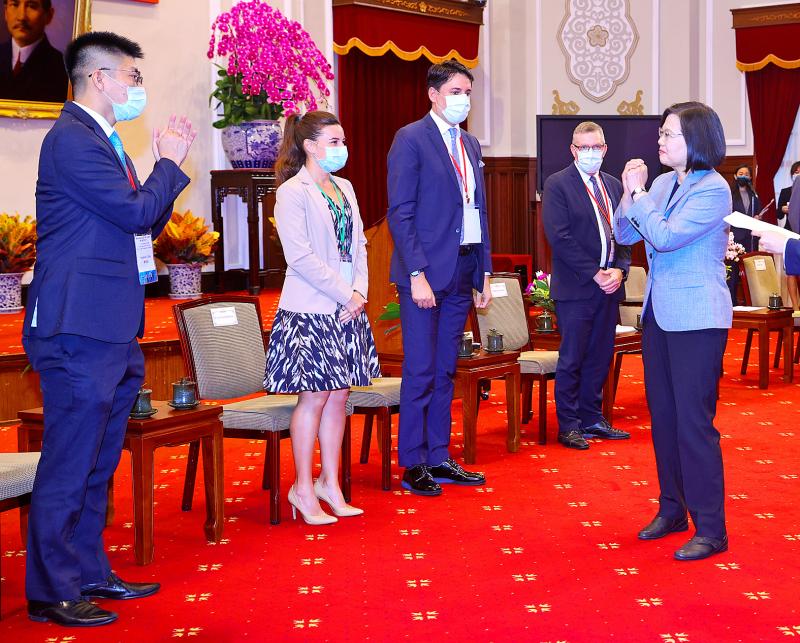President Tsai Ing-wen (蔡英文) yesterday handed out the 998th, 999th and 1,000th employment gold cards to foreign professionals in a ceremony at the Presidential Office in Taipei.
One thousand cards have been issued since the government launched the Employment Gold Card system to attract foreign professionals with outstanding achievements or unique abilities to work, invest and live in Taiwan, Tsai said.
The 998th card was given to Seamon Chan (陳希孟) from the US, who helps Taiwanese start-ups go global through investment in Taiwan, she said.

Photo: CNA
The 999th cardholder is Mustafa Ozgur Baydarol from Turkey, who holds 10 patents and is an inventor in the high-technology sector, Tsai said.
The 1,000th card was presented to American Rodney Dean Morgan, she said, adding that she hoped he would continue to take part in the development of the semiconductor industry in Taiwan.
YouTube cofounder Steve Chen (陳士駿) and many other cardholders from Silicon Valley and around the world also attended the ceremony, Tsai said.
“You are welcome to Taiwan, to work together with us,” she said.
The large number of outstanding professionals in Taiwan exemplifies the numerous opportunities available in the nation amid the restructuring of global supply chains, she said.
Noting that Taiwan’s democracy and freedom, its rich and diverse culture, and safe environment are suitable for investment, Tsai said she believed that with the assistance of international professionals, the nation’s businesses would become more global, and develop a broader vision and strong international competitiveness.
The Taiwan Employment Gold Card system is part of the Act for the Recruitment and Employment of Foreign Professionals (外國專業人才延攬及僱用法), which was implemented in February 2018, to attract highly skilled foreign talent.
The act relaxes regulations on visas, work permits, taxes, insurance, pensions and residency for foreign professionals and their families.
The employment gold card is simultaneously a work permit, residence visa, Alien Resident Certificate and re-entry permit.

The paramount chief of a volcanic island in Vanuatu yesterday said that he was “very impressed” by a UN court’s declaration that countries must tackle climate change. Vanuatu spearheaded the legal case at the International Court of Justice in The Hague, Netherlands, which on Wednesday ruled that countries have a duty to protect against the threat of a warming planet. “I’m very impressed,” George Bumseng, the top chief of the Pacific archipelago’s island of Ambrym, told reporters in the capital, Port Vila. “We have been waiting for this decision for a long time because we have been victims of this climate change for

Rainfall is expected to become more widespread and persistent across central and southern Taiwan over the next few days, with the effects of the weather patterns becoming most prominent between last night and tomorrow, the Central Weather Administration (CWA) said yesterday. Independent meteorologist Daniel Wu (吳德榮) said that based on the latest forecast models of the combination of a low-pressure system and southwesterly winds, rainfall and flooding are expected to continue in central and southern Taiwan from today to Sunday. The CWA also warned of flash floods, thunder and lightning, and strong gusts in these areas, as well as landslides and fallen

MASSIVE LOSS: If the next recall votes also fail, it would signal that the administration of President William Lai would continue to face strong resistance within the legislature The results of recall votes yesterday dealt a blow to the Democratic Progressive Party’s (DPP) efforts to overturn the opposition-controlled legislature, as all 24 Chinese Nationalist Party (KMT) lawmakers survived the recall bids. Backed by President William Lai’s (賴清德) DPP, civic groups led the recall drive, seeking to remove 31 out of 39 KMT lawmakers from the 113-seat legislature, in which the KMT and the Taiwan People’s Party (TPP) together hold a majority with 62 seats, while the DPP holds 51 seats. The scale of the recall elections was unprecedented, with another seven KMT lawmakers facing similar votes on Aug. 23. For a

All 24 lawmakers of the main opposition Chinese Nationalists Party (KMT) on Saturday survived historical nationwide recall elections, ensuring that the KMT along with Taiwan People’s Party (TPP) lawmakers will maintain opposition control of the legislature. Recall votes against all 24 KMT lawmakers as well as Hsinchu Mayor Ann Kao (高虹安) and KMT legislative caucus whip Fu Kun-chi (傅崐萁) failed to pass, according to Central Election Commission (CEC) figures. In only six of the 24 recall votes did the ballots cast in favor of the recall even meet the threshold of 25 percent of eligible voters needed for the recall to pass,